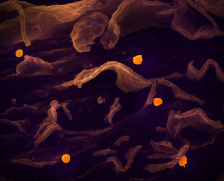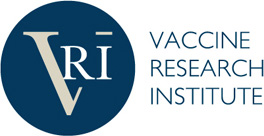An innovative vaccine against Nipah virus infection: a major step forward thanks to the work of Yves Levy’s VRI/IMRB-U955 team and Université Paris-Est

Scanning electron micrograph showing the Nipah virus (yellow) budding on the surface of a cell. ©National Institute of Allergy and Infectious Diseases, NIH
The Nipah virus (NiV) is classified by the WHO as one of the eight main emerging pathogens likely to cause major epidemics in the future. No treatment or vaccine is yet available, but an important step has just been taken thanks to the team led by Yves Levy, VRI/IMRB-U955, and the Université Paris-Est, who recently presented the preclinical results of an innovative vaccine against this virus in the journal Cell Reports Medicine.
The team’s research was based on the central role played by antigen-presenting cells (APCs) in the development of protective responses. The candidate vaccine, called CD40.NiV, is composed of a monoclonal antibody targeting the CD40 receptor on antigen-presenting cells, in particular dendritic cells, associated with certain specific parts of the surface proteins of the NiV-B virus, the Bangladesh strain. CD40.NiV demonstrated immunogenicity with stimulation of neutralising antibody responses, and complete protection (100% survival) after infection with a lethal dose of Nipah virus. The absence of viral replication in vaccinated monkeys demonstrates optimal protection and infection control.
These results represent an important step towards the clinical development of a vaccine against infection. The CD40 platform developed by VRI is currently in clinical development as part of a vaccine against HIV and HPV-related cancer.
The results of this research have just been published in the March 2024 issue of Cell Reports Medicine. Access to the article
Read the Inserm press release

